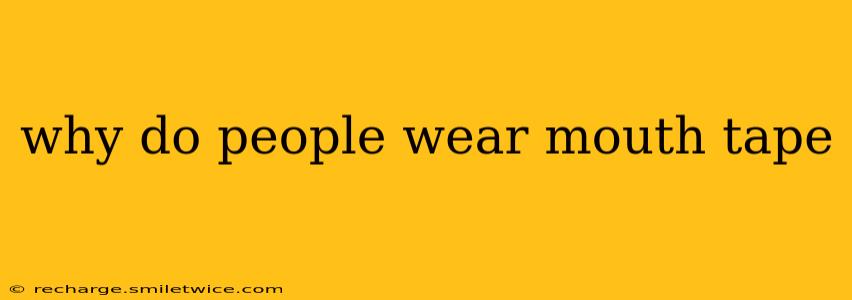Why Do People Wear Mouth Tape? The Surprising Benefits and Risks
Mouth taping, the practice of applying medical-grade tape over the mouth during sleep, has gained popularity as a purported method for improving sleep quality and overall health. While it's not a universally accepted practice, and more research is needed, understanding the reasons behind its use and the potential benefits and drawbacks is crucial. This article delves into the reasons people utilize mouth tape, exploring the science behind its purported effects and addressing common concerns.
What are the Claimed Benefits of Mouth Taping?
Many proponents suggest mouth taping encourages nasal breathing, which they believe offers several advantages:
-
Improved Sleep Quality: Nasal breathing is often associated with better sleep. It's believed that this is due to several factors. Nasal passages humidify and filter the air, leading to less dryness and irritation in the airways, promoting more restful sleep. Furthermore, nasal breathing is thought to regulate the body's carbon dioxide levels, which may contribute to deeper, more restorative sleep stages.
-
Reduced Snoring and Sleep Apnea: Mouth breathing can contribute to snoring and sleep apnea by restricting airflow and causing vibrations in the throat. By promoting nasal breathing, mouth taping might lessen these issues, although more conclusive evidence is needed.
-
Better Hydration: Nasal breathing helps keep the nasal passages moist, contributing to overall hydration. Mouth breathing can lead to dry mouth and throat, potentially negatively impacting sleep and overall well-being.
-
Improved Oral Health: Mouth breathing can lead to dry mouth, increasing the risk of cavities and gum disease. Encouraging nasal breathing through mouth taping may indirectly promote better oral health.
What are the Potential Risks of Mouth Taping?
While the potential benefits are enticing, it's crucial to acknowledge potential risks associated with mouth taping:
-
Skin Irritation: The tape itself can cause skin irritation or allergic reactions in some individuals. Choosing a hypoallergenic tape is essential.
-
Difficulty Breathing: For people with underlying respiratory conditions, mouth taping might make breathing difficult or even dangerous.
-
Carbon Dioxide Buildup (in rare cases): While generally not a significant concern for healthy individuals, some worry about potential carbon dioxide buildup if nasal passages are severely obstructed. This is more of a theoretical concern, and well-documented cases are rare.
-
Claustrophobia: The feeling of the tape on the mouth can be unsettling for some people, exacerbating feelings of claustrophobia.
Is Mouth Taping Right for Everyone?
Mouth taping isn't a one-size-fits-all solution. It's crucial to consult with a healthcare professional, such as a doctor or sleep specialist, before trying it. They can assess your individual health and determine if it's a suitable practice for you. Pre-existing conditions like respiratory issues or allergies must be considered.
How to Use Mouth Tape Safely (If Recommended by a Doctor):
If your doctor approves, ensure you use hypoallergenic, medical-grade tape designed for skin contact. Only apply it gently and remove it carefully to avoid skin irritation. Start with shorter periods and gradually increase the duration as tolerated.
Alternatives to Mouth Taping:
Consider exploring other strategies to improve your sleep and breathing, such as:
- Nasal strips: These over-the-counter aids help to open nasal passages.
- Improving sleep hygiene: Establishing a regular sleep schedule and creating a conducive sleep environment.
- Treating underlying conditions: Addressing any medical conditions that might be contributing to sleep problems or mouth breathing.
Conclusion:
While mouth taping has gained traction as a potential sleep aid, it's crucial to approach it cautiously. The potential benefits, primarily related to improved sleep and nasal breathing, need further research to solidify their validity. Always consult with a healthcare professional before trying mouth taping, particularly if you have any underlying health conditions. They can provide personalized advice and ensure this practice is safe and appropriate for your individual circumstances.
